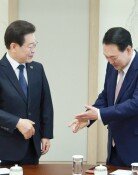Yen Carry Traders Rushing to Korean Stock Market
Yen Carry Traders Rushing to Korean Stock Market
Posted February. 07, 2009 09:01,
Foreign investors left Koreas stock market in droves last year with the onset of a new financial crisis, but many have since returned to Korea.
Their return stems from their desire to generate exchange gain by purchasing Korean stocks with a weak won and selling them when the currency strengthens. Stock experts, however, are trying to find out who the investors are and why they chose to return to Korea.
On Koreas benchmark KOSPI stock market Friday, foreign net buying reached 98.4 billion won (71 million U.S. dollars), extending the net buying streak for the eighth straight trading day since Jan. 28.
This is the first time that foreign investors net bought for this long since April 2007 before the global financial crisis affected the world economy. Boosted by foreign net buying, the KOSPI surged 32.38 points (2.75 percent) to close at 1,210.26, surpassing the 1,200 mark for the first time since Jan 8.
Stock analysts said American investors have bought the most Korean stocks (424.8 billion won or 308 million dollars) from early this year to Feb. 2, followed by those from Hong Kong (212.3 billion won or 154 million dollars), and Germans (99.6 billion won or 72 million dollars).
American investors in 2007 had dumped Korean stocks in the wake of the global credit crunch, resulting in a sharp drop in Korean stocks.
Certain experts say Japanese investors began buying Korean stocks this month. As lower interest rates have resulted in a lower yielding rate in many economies, yen carry traders who borrowed yen at Japans ultra-low interest rates and invested the fund into nations with high-yielding currencies such as Australia and New Zealand have turned to Korea, whose stock prices have fallen.
Given that the Korean stock market joined the FTSE developed index in September last year, some even forecast that more Korean stocks will be bought by yen carry traders, who love to invest in developed economies.
Other experts said foreign investors have returned to the Korean market since major Korean companies recently performed better than their foreign counterparts.
Koreas flagship company Samsung Electronics recorded an operating deficit in the last quarter of last year, but showed a better performance than its Japanese competitors suffering from the strengthening yen. The Hyundai-Kia Automotive Group became the only major carmaker last month whose sales volume increased in the U.S. market. Since the beginning of the year, foreign investors have only bought stocks of major companies such as Samsung Electronics, SK Telecom and POSCO.
Nobody knows for sure, however, just how long foreign investors will keep buying Korean stocks. Kim Hak-gyun of Korea Investment & Securities said, Foreign investors response will depend on the global financial market. If global stock markets face uncertainty again, the comparative advantage of Korean companies will not be enough to attract foreign investors.
jarrett@donga.com







